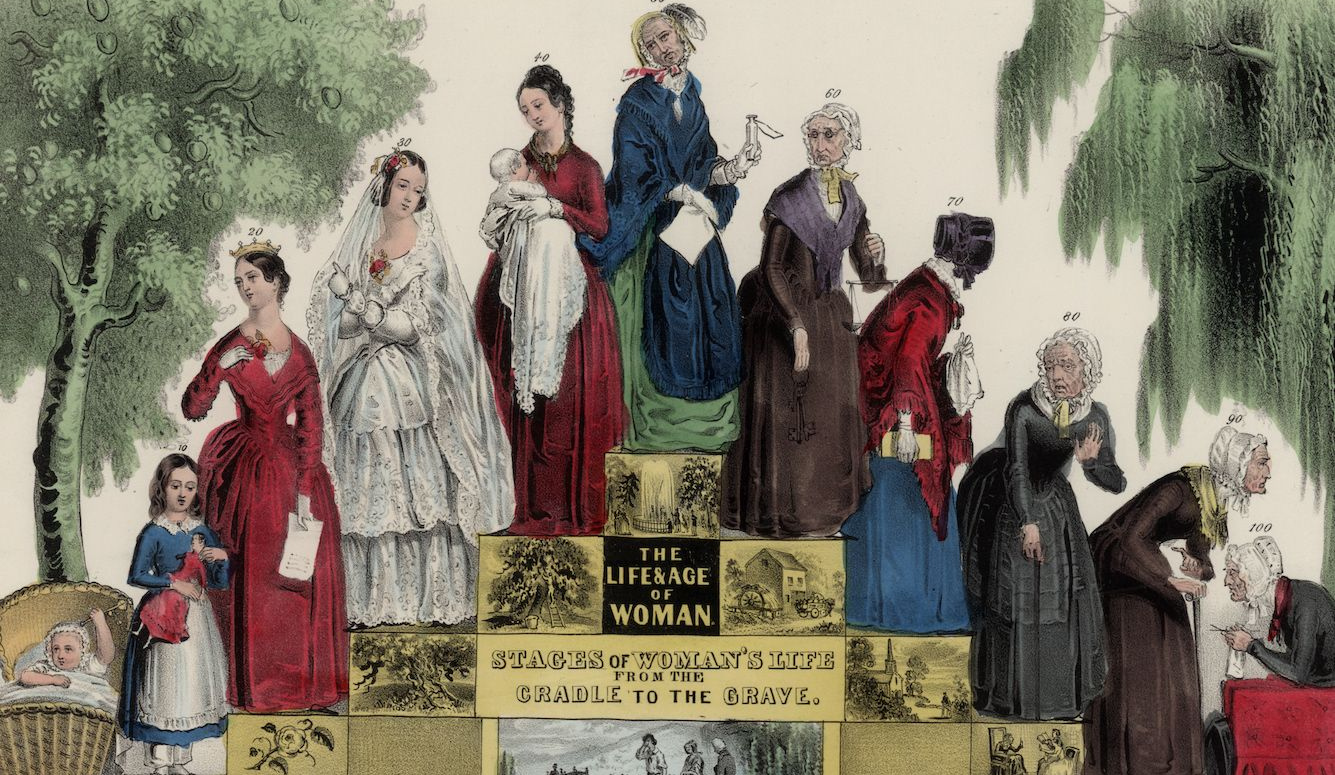Transgender
What Is a Woman? Many Philosophers Know, But Aren’t Allowed to Say
An April 17 Quillette article about sex and gender by MIT scholar Alex Byrne prompted yet another round of debate and denunciation among his contemporaries.

Last week, Alex Byrne, a professor of philosophy at MIT, published a Quillette article describing violations of standard norms on academic publishing experienced by himself and Holly Lawford-Smith, a political philosopher at the University of Melbourne. Byrne and Lawford-Smith are two of very few philosophers—and Byrne is the only senior philosopher (that is, of independent name recognition in the discipline)—who’ve been willing to publicly defend some claims inconsistent with contemporary orthodoxy in the philosophy of sex and gender.

In particular, Lawford-Smith has argued for the political claim that female people have the right to spaces, services, and provisions of their own, while Byrne has argued for the more general claim that women are adult human females. Lawford-Smith’s arguments run counter to the orthodox view that males who identify as women have a right to everything to which female people have a right, and Byrne’s run counter to the orthodox view that males who identify as women are women.
Both Byrne and Lawford-Smith are also skeptical of the theoretical posit of a universal, innate sense of “gender identity,” which, on the orthodox view, can fail to align with one’s actual sex; such misalignment is supposed to explain the phenomenon of gender dysphoria, i.e., discomfort with certain of one’s sex characteristics. Lawford-Smith has argued that sex takes political priority over gender identity, while Byrne has argued that the empirical predictions of the theory of gender identity are false.
For challenging gender orthodoxy in such ways, Byrne and especially Lawford-Smith have been widely vilified, and—according to Byrne’s article—each has had book contracts cancelled by Oxford University Press (OUP), the leading publisher in philosophy, on flimsy pretexts; although due to the intervention of the UK’s Free Speech Union, Lawford-Smith’s contract was reinstated.
In philosophy, Byrne and Lawford-Smith’s experiences have been shared by Kathleen Stock, formerly professor of philosophy at Sussex University, author of Material Girls and the subject of repeated cancellation attempts and denunciations. Outside philosophy, other writers who have challenged gender orthodoxy or reported the evidence for a medical scandal in the making, such as journalists Helen Joyce, author of Trans, and Hannah Barnes, author of Time to Think, also have faced difficulties in getting their books published and been subjected to similar forms of vilification.

The day after it was published, Byrne’s essay was shared on Daily Nous and Leiter Reports, the philosophy profession’s two leading blogs. The original post at the Daily Nous soon received more than 500 comments, many of which ran into the hundreds of words; a follow-up post received another 100 or so. The contributions to—and perhaps still more revealingly, omissions from—the discussion provide a useful glimpse into exactly the dynamics that Byrne describes in his essay.

First, judging by the “likes” on comments, it was clear that a majority of readers shared Byrne’s perception that something has gone badly wrong in the methodology of the philosophy of sex and gender. The most-liked comment—tellingly, written under the name “I don’t want to lose my career, thanks”—read:
I know people with very liberal, CNN approved views on trans issues (philosophers far, far to the left of Byrne) who have abandoned writing on gender and feminism because the peer review situation in these areas is so bad. What is and isn’t acceptable to say moves rapidly fast, and getting it wrong means potentially get[ting] screamed at in a referee report, and I think these people just got sick of dealing with the unprofessionalism in the area.. It’s really like nothing I’ve ever seen before. Yes peer review in all areas of philosophy is problematic, but feminism and especially trans stuff seems pretty next level. If you haven’t encountered it first personally, it’s almost hard to believe. If the subfield wants to be take [sic] seriously by the rest of the field, it needs to clean up its act.
This was not a surprise. As Byrne himself suggested in his original essay, philosophy is far from the worst offender with respect to its embrace of gender orthodoxy. Within academia itself, philosophy remains significantly less captured than neighbouring academic disciplines in the humanities and the social sciences. Meanwhile, outside academia, the arts and wide swathes of journalism and politics are similarly in the grip of gender orthodoxy: witness the attempt by the Scottish National Party (SNP) to force through the Gender Recognition Reform bill, which would have trivialized the requirements on changing one’s legal sex. It was instead blocked by Westminster, following the revelation that standing Scottish policy was for some unreconstructed male rapists to be remanded to women’s prisons.
That the SNP would embark on a measure that led to widespread Scottish support for an intervention by Westminster in Scottish politics provides a general reminder that, contrary to the title of the Daily Nous post—“What It’s Like to Be a Philosopher with Unpopular Views on a Controversial Subject”—gender orthodoxy is orthodox only among a small, if influential, minority. The pattern of comments and likes at the Daily Nous suggests that the situation in philosophy is broadly similar.
Nor was it a surprise that a vocal and intransigent minority of commenters at the Daily Nous refused to recognise that there had been unusual violations of standard norms on academic publishing. Motivating their insistence that there was nothing to see here seemed to be an uncritical confidence that challenges to gender orthodoxy were philosophically and morally unsound.
For instance, “Mid-Career Ethicist” speculated:
Suppose that a scholar sends an academic press a proposal for a book defending a position on the metaphysics of race. The scholar is well-established in another field of philosophy but has published little on philosophy of race. Based on the book proposal, the reviewers and the editor expect the book to be provocative and controversial but not beyond the pale. The press offers the scholar a book contract. The completed manuscript turns out to be a thinly-veiled defense of 19th century “scientific racism.” The manuscript has a long bibliography, but most of the chapters present arguments of poor quality. Some chapters read like rants. What should the press do with this manuscript? Must the reviewers reply to the author’s racist rants point-by-point? Must the press offer the author an opportunity to submit a revised manuscript? Is the press ethically required to publish what the author submits?
In a similar spirit, “Junior Queer Philosopher” wrote:
Who cares if trans-exclusionary work gets pushed out of philosophy and into places like Quillette and “The Journal of Controversial Ideas”? Some discussions are not within the bounds of polite liberal discourse in the marketplace of ideas and should be forced into more extreme venues that reflect their (il)legitimacy.
And an assistant professor of philosophy, confident enough to write under his own name, suggested:
Some things just can’t be taken seriously (can only be advocated for through unserious techniques like rhetorical nudges and sleight of hand) and so shouldn’t be discussed seriously in philosophical contexts. “The earth is flat after all” can’t be taken seriously, and neither can “gender rests on a biological binary.”
Note that since sex is a biological binary, this latter comparison in effect reduces to the claim that “gender rests on sex” is as obviously false as “the earth is flat,” which it is not, even on the assumption of gender orthodoxy: for instance, the feminist philosopher Louise Antony claims “that human sex difference is the material ground of systems of gender” in the course of arguing that women need not be female.
However, perhaps the most revealing comment was due to “On The Market,” a particularly active member of the “nothing to see here” faction. In a 650-word mini-essay beginning “Almost 300 comments in and I still have not seen any evidence that anything untoward has happened here,” “On The Market” argued:
I’d presume that we proceed from the default assumption that our peer review practices are broadly robust. Sure, many bad papers get through, but if a particular type of view consistently and repeatedly appears, if at all, in venues on the margins of professional recognition, then I take this to be evidence against the view, not against the robustness of peer review. If Professor Byrne, with his unquestionable intellect, has laid down the very best defense of this particular view, and still it did not pass OUPs process, why am I not to take this as evidence that even the very best defense of this view is just not very good? And if, as is the case, other people have failed at the same task, why should this impugn the review process, rather than, again, the view itself?
At face value, this exemplifies the pernicious tendency of bans on speech to be epistemically self-laundering: the expression of dissent is made taboo, and the resulting absence of dissent is treated as evidence for the legitimacy of the taboo.
Significantly, many skeptics of Byrne’s narrative seemed to be younger members of the profession, unlikely to have had personal experience with publishing a book. They may well think that any reason supplied by OUP for rejecting a book, at any stage of the process, is good enough. In any case, the Daily Nous thread eventually degenerated into comment after comment refusing to take any professional norm for granted. The growing air of unreality was captured by a senior philosopher, attempting to take leave from the thread to return to his day job as the world’s leading philosopher of physics:
It is getting difficult to follow the thread, and increasingly tedious to be painstakingly defending from first principles claims about the way publishing in our profession works that everyone agreed upon five minutes ago … but which are now suddenly being denied. Anyway, I have a forthcoming paper in an edited collection that I need to finish writing.
Instructively, his comment continued:
It is intellectually defensible to hold that there are no good arguments for view X, and that we know this because if there were, they would have got through peer review. It is also at least *intellectually* defensible to hold that view X is beyond the pale, that any argument that makes the key presuppositions of view X is ipso facto harmful, and that we should not tolerate view X appearing in our journals. It takes a certain mental agility to hold both concurrently.
The spill-over of the discussion onto Twitter provided ample illustration that highly moralised attitudes toward views like Byrne’s were indeed in play; one philosopher who attempted to defend Byrne was charmingly paraphrased in a tweet as having “said that Mengele did nothing wrong.”
There definitely isn't a chilling climate here. Just friendly, good faith contributions on all sides. pic.twitter.com/GQrle1FnzB
— Molly Gardner (@MollyTheGardner) April 19, 2023
Rather more concerningly, in response to “On The Market,” “On the Inside (anon for obvious reasons)” commented:
As someone employed by the university press in question [OUP], I thank you for articulating this so efficiently. This is not a question of academic freedom but rather one of academic integrity and recognizing that scholarly output can and does affect policy. It is irresponsible and transparent when those supporting GC [gender-critical] beliefs claim otherwise. If the violent and horrific attacks against the trans and NB [non-binary] community aren’t convincing enough, try looking into the extremely high rates of suicide ideation and attempts by trans youth.
As “Disappointed Grad Student” commented on a Leiter Reports thread:
Obviously we cannot be sure that this commenter [On the Inside] is honest about his employment at OUP, but if he is, then it is clear that the book was not rejected on the merits. (Not that anyone could look at this debacle in good faith and think that that’s a live option anymore.) Many sensible commenters over at the Daily Nous keep insisting the obvious point that whether the opinions found in GC scholarship constitute harms is itself one of the questions to be adjudicated under the magnifying glass, but this (obvious) remark falls on deaf or stubborn ears.

(A further natural expectation, it might be added, is that when a live concern is the appropriate medical treatment of a group of children and teenagers prone to suicidal ideation, it is particularly important not to short-circuit potentially relevant academic enquiry; and a further irony is that there is an emerging international medical consensus—embodied by Sweden, Finland, Britain, France, and Norway—against the sorts of dramatic medical interventions championed by gender orthodoxy’s activist wing.)
In his original article, Byrne had claimed that OUP rejected his book “for the sole reason that ‘the book does not treat the subject in a sufficiently serious and respectful way.’ No errors in the manuscript were identified … and no revisions were allowed.” This was eagerly called into question when the relevant OUP editor explained in an email that “the manuscript underwent peer review, and Alex was given comments on the manuscript from me and from four expert readers. On the basis of these assessments, my judgment was indeed that the work was not appropriate for publication by OUP.” There was temporarily convergence among Byrne’s opponents in the expectation that his book had been rejected for reasons that he had elided, and the whole thing was to be chalked up to sour grapes.
However, when Byrne finally shared the rejection email that he had received, the full stated rationale for rejection indeed read: “I’m afraid our judgement is that the book does not treat the subject in a sufficiently serious and respectful way. The same kinds of problems that I found with the introduction we now find continue throughout the book.” These problems were, as indicated, ones of tone, not content.

For instance, in an early draft of the introduction and first chapter, Byrne had included such phrases as “the Perpetually Outraged on the internet” and “fancy-sounding academese.” In response to the editor’s comments, Byrne removed those phrases from the submitted manuscript, making it all the more striking that he was not given the chance to make further revisions to the submitted manuscript itself.
That a common reaction on Twitter to Byrne’s rejection email was to be struck that it was so “thoughtful,” “respectful,” and “helpful” might further encourage speculation regarding the unfamiliarity of Byrne’s critics with standard professional norms.
This seems *very* respectful and helpful.
— Synthesizer of Apperception (@shopenhauerlate) April 23, 2023
*My* submissions almost never get any comments back lol.
Yet perhaps the most revealing feature of the 600-plus-comment discussion on the Daily Nous was not what was said, but what went almost completely unsaid. There were two striking omissions.
The more immediately glaring omission consisted in the near-total neglect of the experiences of Lawford-Smith, which had been as important a part of Byrne’s narrative as his own. In advance of the publication of her first book, Gender-Critical Feminism, Lawford-Smith had been the subject of a vicious open letter, falsely accusing her of the “public mobilization of transphobic rhetoric and bigotry with the explicit objective of denying trans people the right to live freely or to exist at all.” Although the open letter was circulated too late for OUP to reconsider publishing Gender-Critical Feminism, OUP did attempt to cancel Lawford-Smith’s forthcoming book, Sex Matters (but, as noted above, reversed its decision following an intervention by the Free Speech Union).
In a subsequent revelation on Leiter Reports, Richard Marshall, author of hundreds of interviews with philosophers, 50 of which had previously been collected in two volumes published by OUP, commented:
Stock and Lawford-Smith have been targeted by OUP editors since at least 2019 when a book I was editing—and proposed by OUP—was pulled for bullshit reasons because they were included in it. As we all know by now, their careers have been seriously jeopardized by this and subsequent attempts to repress their legitimate academic work. Stock has had to leave her job at Sussex University. Lawford-Smith is being similarly targeted. When my Women Philosophers book was cancelled because I included Stock and Lawford-Smith (alongside twenty-five other women philosophers!) I was personally inconvenienced, nothing more. But I had big problems with OUP’s behaviour. I wouldn’t have had if there had been solid editorial reasons for pulling the book. But this decision was all bullshit. I read back the emails between myself and OUP, and it was clearly the 3ammagazine Lawford-Smith scandal that changed everything. OUP’s response to that particular fiasco was to censor two tenured women philosophers for their philosophical work.

As Marshall added, “So that’s three working philosophers being censored by OUP for doing what they’re being paid to do!” In effect, rationalisations of OUP’s cancellation of Byrne’s book accomplish nothing if they fail to generalise to the cancellation of Marshall’s book and attempted cancellation of Lawford-Smith’s.
The elision of Lawford-Smith from the Daily Nous discussion (in more than 500 comments, she was mentioned some dozen times, and almost exclusively by Byrne’s supporters) was exactly of a piece with the narrow focus on the exact content of standard norms on academic publishing. In brief, proponents of orthodoxy in the philosophy of sex and gender seemed intent on missing the forest for the trees. Their approach was to attempt to get some charge against Byrne to stick, then leverage that charge to establish that his broader narrative was unreliable.
The second omission—less immediately glaring, but perhaps of deeper significance—consisted in the near-absence of expressed sympathy for Byrne’s views themselves. In effect, the Daily Nous debate remained almost exclusively second-order, at the level of academic norms. On the one hand, a concern with violations of standard academic norms is fully appropriate. In general, ad hoc restrictions on academic speech are warning signs of underlying errors. If gender orthodoxy can be defended by articulated argument, then why would defenders of orthodoxy block and censure attempts to articulate arguments against it? The uneasy conclusion which suggests itself is that gender orthodoxy cannot be defended by articulated argument.
Yet one moral of the debate on Daily Nous is that views as to the second-order questions are not fully independent of views as to the status of orthodoxy in the philosophy of sex and gender. In particular, the commenters most convinced of orthodoxy tended to insist that there were no violations of academic norms, while a natural suspicion is that many commenters who did recognize violations of academic norms are at least not convinced of orthodoxy.
And how could they be? After all, the central claims that Byrne and Lawford-Smith are on record defending—women are adult human females; female people have the right to spaces, services, and provisions of their own—are not just worth engaging with by the liberal standards of philosophy. (This is a discipline, remember, in which views that are considered worth engaging with include that there are no numbers; that there are no people; that there are no minds; that nothing is right or wrong; that nothing is known; and even that there are true contradictions. Incidentally, in every case, OUP has published books defending the relevant doctrine.)
Rather, such views appear to be the default hypothesis with respect to the relevant questions. This is particularly clear in regard to Byrne’s claims that women are adult human females and that men are adult human males. For the gender-orthodox position that there are male women and female men requires positing exceptions to various simple and informative generalisations: most obviously, “all women are female,” “all (adult human) males are men,” “all men are male,” and “all (adult human) females are women.” Gender orthodoxy also encourages a form of human exceptionalism, on which it is important for members of all other animal species to have knowledge of the sex of other members of their species, but not important for humans to have knowledge of the sex of other humans—for if it were important, why wouldn’t we have words that permitted us to express information about (adult) human females and (adult) human males? (In English, “man” and “woman” are the only good candidates.)
Of course, the exceptions posited by gender orthodoxy should not be dismissed in advance of enquiry; sometimes, simple and informative generalisations are indeed too simple. Yet the systematic disruption of attempts to articulate and defend the default hypothesis in a certain area is methodologically perverse. It would perhaps be less perverse if attempts to articulate and defend the default hypothesis about “man” and “woman” had been permitted and found wanting—not just by university press insiders, but by normal collective standards. But that is not what has happened, which is rather that such attempts have not been permitted in the first place.
Part of what makes the state of affairs in philosophy so troubling is that, judging from private conversations with other philosophers, this methodological situation is recognised by many, and suspected by even more. In effect, it is widely believed, and more widely suspected, that orthodoxy in the philosophy of sex and gender is importantly mistaken. Yet as one senior philosopher commented on Leiter Reports, “concerns [about OUP’s treatment of Byrne] are in fact widely shared, but many people are reluctant to go public, for fear of vilification and career harm,” to which another added “It is also true that the censorious scolds are absolutely indefatigable and never back down or stop. Engaging with that kind of opponent is like committing to eternal war—it’s just too exhausting.” In turn, the reluctance to express (even tentative) agreement with Byrne is near-universal.
Again, that is not to castigate philosophers for their reluctance to go public in expressing agreement with Byrne or Lawford-Smith. For one thing, there is an obvious collective action problem: any individual philosopher who goes public risks suffering significant personal costs for little public benefit. (In this regard, it may be noted that I am myself writing under a pseudonym.) And as a more specific point, although it is false that recognition of the violations of academic norms experienced by Byrne and Lawford-Smith depends on prior agreement with their views, any indications of agreement are liable to be exploited as “revealing” that claims that academic norms were violated are really motivated by such agreement.
However, those disposed to make such accusations of bad faith need no such excuse for making them. For instance back at the Daily Nous, “On The Market” insisted:
All the moral outrage in here, the hand-wringing about academic freedom, accusations of bias, institutional capture, and chilled discourse in the profession — they all proceed from the PRESUPPOSITION that the gender critical view is intrinsically deserving of publication in our highest venues.
The implicit assumption is that no one could think that challenges to gender orthodoxy should be published in widely accessible venues precisely so that they can evaluate the status of those challenges for themselves.
In any case, philosophers would do well to trust their instinct that something has gone badly wrong in the philosophy of sex and gender. In particular, they should have more confidence in their suspicion that not only are there invidious obstacles to publishing some plausibly publishable work in the philosophy of sex and gender, but there are invidious obstacles to publishing some plausibly correct work in the philosophy of sex and gender. The more philosophers explicitly acknowledge that much to themselves, the more they may find themselves, perhaps despite themselves, challenging gender orthodoxy in more public contexts.







